DeMar DeRozan, 6-6, Freshman, Shooting Guard, USC
11.2 points, 4.5 rebounds, 1.2 assists, 2.4 turnovers, 49% FG, 58% FT, 0-12 3P
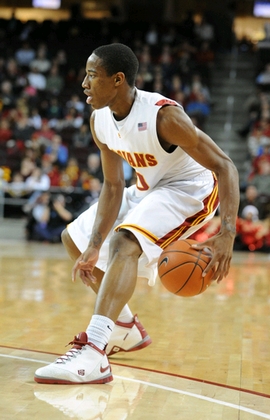
Jonathan Givony
The expectations were sky-high for DeMar DeRozan entering his freshman season. Not only was he expected to fill the massive shoes of O.J. Mayo for USC, but he was also looked at by NBA scouts as possibly the top prospect in his class.
The start was fairly inconspicuous, after failing to hit double figures in three of his first five games. Lately things have been a bit better, with 18 and 17-point outings in his past two games, but it still feels a little premature to evaluate, despite the fact that we're about a third of the way through the NCAA season.
DeRozan's tools and overall talent are pretty obvious. He's an excellent athlete with good instincts on both ends of the floor, and shows great sparks of potential from time to time with some of the moves he's able to execute. USC runs a variety of plays to take advantage of his athleticism, throwing lobs for him on out of bounds plays, trying to get him a clear path to the rim with backdoor cuts, and always looking for him in transitionwhere he truly excels. He's been able to come up with some highlight reel finishes from time to time, but there's no doubting just how raw he is currently in the half-court.
As a ball-handler is where DeRozan needs to improve the most, as he really struggles to take advantage of his superior athleticism, having all kinds of problems creating his own shot. He can't really change directions with the ball or beat his man with an advanced move, and is thus entirely reliant on others to create offense for him, which is a bit of a problem for a team without a true point guard. That's one of the reasons he's getting to the free throw line just over three times a game, which is somewhat underwhelming considering the physical advantages he enjoys over his opponents. Turnovers have been somewhat of a problemhe coughs up the ball on 22% of his possessions, and averages twice as many turnovers as assists.
Perimeter shooting is another major weakness at the momenthe's currently 0/12 from beyond the arc, and is shooting just 58% from the free throw line. His mechanics look decent, and he can create separation nicely on his pull-up jumper for example, but he just hasn't been able to be a threat from the perimeter just yetsomething that could come later in the season.
On the positive side, DeRozan has looked fairly unselfish, not really forcing the issue that much and moving the ball around pretty well, which is a good sign. He puts a solid effort in on the defensive end too, although he lacks significant experience here, which makes him very inconsistent.
All in all, DeRozan is probably fortunate to have not been thrown straight into the NBA fire right out of high schoolhe is in no shape or form ready to compete at that level, as his average production in the NCAA will attest. He might even want to start thinking about spending a second year in college, in order to significantly improve his skill-level and feel for the game. As mentioned, it's probably a little early to draw any final conclusions just yet.
The start was fairly inconspicuous, after failing to hit double figures in three of his first five games. Lately things have been a bit better, with 18 and 17-point outings in his past two games, but it still feels a little premature to evaluate, despite the fact that we're about a third of the way through the NCAA season.
DeRozan's tools and overall talent are pretty obvious. He's an excellent athlete with good instincts on both ends of the floor, and shows great sparks of potential from time to time with some of the moves he's able to execute. USC runs a variety of plays to take advantage of his athleticism, throwing lobs for him on out of bounds plays, trying to get him a clear path to the rim with backdoor cuts, and always looking for him in transitionwhere he truly excels. He's been able to come up with some highlight reel finishes from time to time, but there's no doubting just how raw he is currently in the half-court.
As a ball-handler is where DeRozan needs to improve the most, as he really struggles to take advantage of his superior athleticism, having all kinds of problems creating his own shot. He can't really change directions with the ball or beat his man with an advanced move, and is thus entirely reliant on others to create offense for him, which is a bit of a problem for a team without a true point guard. That's one of the reasons he's getting to the free throw line just over three times a game, which is somewhat underwhelming considering the physical advantages he enjoys over his opponents. Turnovers have been somewhat of a problemhe coughs up the ball on 22% of his possessions, and averages twice as many turnovers as assists.
Perimeter shooting is another major weakness at the momenthe's currently 0/12 from beyond the arc, and is shooting just 58% from the free throw line. His mechanics look decent, and he can create separation nicely on his pull-up jumper for example, but he just hasn't been able to be a threat from the perimeter just yetsomething that could come later in the season.
On the positive side, DeRozan has looked fairly unselfish, not really forcing the issue that much and moving the ball around pretty well, which is a good sign. He puts a solid effort in on the defensive end too, although he lacks significant experience here, which makes him very inconsistent.
All in all, DeRozan is probably fortunate to have not been thrown straight into the NBA fire right out of high schoolhe is in no shape or form ready to compete at that level, as his average production in the NCAA will attest. He might even want to start thinking about spending a second year in college, in order to significantly improve his skill-level and feel for the game. As mentioned, it's probably a little early to draw any final conclusions just yet.
B.J. Mullens, 7-0, Freshman, Center, Ohio State
7.8 points, 4.1 rebounds, .1 assists, 1.2 turnovers, 1.1 blocks, 55% FG, 61% FT, 17.4 minutes

Jonathan Givony
Playing for Thad Matta is definitely not all fun and games, as freshman B.J. Mullens has learned over the last month and change. The 7-foot center has been on an extremely short leash thus far, which should make him a much better player over the long term. Coming off by far his best game of the seasona 19-point, 8 rebound, 3 block effort in an easy win over UNC-Asheville, this seems like as good a time as any to summarize Mullens' first taste of college basketball.
The minimal amount of high-level coaching Mullens received early in his basketball career has put him at a significant disadvantage early on as a college player. His questionable conditioning, poor fundamentals and lackluster effort have clearly drawn the ire of Coach Matta, and will have to improve significantly if he's to see increased playing time as the season moves on. Mullens often looks very lazy getting back on defense, will rarely box out for rebounds, and seems very slow to pick up on the defensive concepts that are being asked of him by the coaching staff.
Right now, Mullens is just bigger, stronger, more athletic and far more talented than anyone else he's faced. We're still yet to see whether he can use advanced moves to score, put the ball on the floor, or find the open man out of the double team. On a different team, for example Kansas State, Mullens would probably be able to play 30+ minutes per game and be able to average 20 and 10 just off his pure talent. An impressively built 7-footer, Mullens runs the floor like a guard, has terrific hands and is a fantastic finisher around the basket thanks to his excellent athleticism. He is hungry to score and can cause some serious damage with his back to the basket, drawing fouls at a high rate, showing nice touch, good body control and impressive instincts putting the ball in the net.
Mullens is being asked to do a lot more than just that, though, which is why he's only played 17 minutes per game through his first nine contests. Often the first one down the floor on offense, he's typically the last one to get back on defense. The concept of a zone defense looks completely foreign to him, and it's very typical to see him completely out of place (sometimes wildly chasing a steal), which causes his team's entire defense to collapse. He looks very lost at times trying to do anything more than use his pure instincts, which is a bit of a concern when you consider how tactical the NBA is on both ends of the floor. The one assist he's dished out through nine games, compared with 11 turnovers, tells the story quite well regarding his basketball IQ and understanding of the game at the moment.
Ohio State's schedule will stiffen significantly over the next few weeks, which should tell us quite a bit more about Mullens' progress. So far he's shown great flashes of potential, while waving some huge red flags about his fundamentals and mental outlook. Just a freshman, there is still plenty of time to improve, although it's obvious that he could use at least one if not two more seasons at Ohio State before he decides to bolt for the NBA. From what we're told, and mostly due to his family's financial situation, this is absolutely going to be his lone season of college basketball, for better or worse.
The minimal amount of high-level coaching Mullens received early in his basketball career has put him at a significant disadvantage early on as a college player. His questionable conditioning, poor fundamentals and lackluster effort have clearly drawn the ire of Coach Matta, and will have to improve significantly if he's to see increased playing time as the season moves on. Mullens often looks very lazy getting back on defense, will rarely box out for rebounds, and seems very slow to pick up on the defensive concepts that are being asked of him by the coaching staff.
Right now, Mullens is just bigger, stronger, more athletic and far more talented than anyone else he's faced. We're still yet to see whether he can use advanced moves to score, put the ball on the floor, or find the open man out of the double team. On a different team, for example Kansas State, Mullens would probably be able to play 30+ minutes per game and be able to average 20 and 10 just off his pure talent. An impressively built 7-footer, Mullens runs the floor like a guard, has terrific hands and is a fantastic finisher around the basket thanks to his excellent athleticism. He is hungry to score and can cause some serious damage with his back to the basket, drawing fouls at a high rate, showing nice touch, good body control and impressive instincts putting the ball in the net.
Mullens is being asked to do a lot more than just that, though, which is why he's only played 17 minutes per game through his first nine contests. Often the first one down the floor on offense, he's typically the last one to get back on defense. The concept of a zone defense looks completely foreign to him, and it's very typical to see him completely out of place (sometimes wildly chasing a steal), which causes his team's entire defense to collapse. He looks very lost at times trying to do anything more than use his pure instincts, which is a bit of a concern when you consider how tactical the NBA is on both ends of the floor. The one assist he's dished out through nine games, compared with 11 turnovers, tells the story quite well regarding his basketball IQ and understanding of the game at the moment.
Ohio State's schedule will stiffen significantly over the next few weeks, which should tell us quite a bit more about Mullens' progress. So far he's shown great flashes of potential, while waving some huge red flags about his fundamentals and mental outlook. Just a freshman, there is still plenty of time to improve, although it's obvious that he could use at least one if not two more seasons at Ohio State before he decides to bolt for the NBA. From what we're told, and mostly due to his family's financial situation, this is absolutely going to be his lone season of college basketball, for better or worse.
Willie Warren, 6-4, Freshman, Shooting Guard, Oklahoma
14.9 Points, 2.6 Assists, 1.8 Turnovers, 1.5 Rebounds, 1.6 Steals, 49% FG, 32% 3P, 75% FT
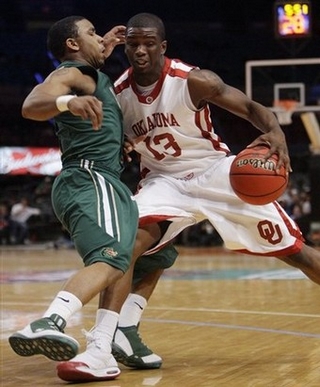
Scott Nadler
With player of the year candidate Blake Griffin receiving all of the attention, it's been the impressive play of freshman, Willie Warren, that has not only helped make the Oklahoma Sooners a top five team, but has turned Warren himself into a very intriguing prospect. Coming out of North Crowley (TX) High School and being a McDonald's All-American, Warren was one of the most highly touted freshmen entering this college basketball season, and he has not disappointed. With the ability to score and handle the ball, Warren can cause havoc this season in the Big 12, and is a legitimate threat to light it up on any given nightas he showed just last game by scoring 31 points at Rice.
Warren is a 6'4 shooting guard who displays great strength, excellent athleticism and a very long wingspan. Although he has been asked to play the point on occasion, Warren is a natural shooting guard with a scorer's mentality. He is currently averaging 20 points per-40 pace adjusted on 49% shooting from the field, and is 6th in the country in scoring amongst freshman.
Warren can score in a multitude of ways, yet he relies heavily and settles for too many 3's, where he is shooting a dire 32.1% on 4.3 attempts a game. He has a very low release point, as he shoots the ball from his chin. It has not been an issue thus far, as he gets it off fairly quickly, but it is going to be something to keep an eye on with conference play being around the corner.
He's proven he can hit shots from deep, but he has been very inconsistent thus far, as evidenced by a 22 point effort (11-13 FT Line) against Purdue, followed by a 5 point outing on 2 for 6 shooting against USC. The inconsistency is in his shooting mechanics as well; as he won't always get the same lift off from shot to shot. He can go from shooting a set shot to elevating high off the court in the same game, not a good quality for any shooter. His confidence is never really affected however, as he plays with a certain swagger and self assurance which is easy to see.
In order for Warren to maximize his potential, he will need to better take advantage of his quickness and great ball-handling skills. When he decides to go to the basket or get in the paint, he's proven that he can get by quick defenders because of his ability to change speeds and finish in traffic with his strength. On the other hand, Warren has shown a tendency to play out of control and over commit on a drive instead of utilizing a jump stop. Once he gains experience and learns how to control himself in the lane, his production will skyrocket.
In terms of going to the basket, Warren uses both hands effectively, but finishes with his right hand almost all of the time on both sides. He has a good knack of hitting the in-between shot but it would be nice to see him use his gifts to get to the foul line more (3.6 attempts per game). On the downside, he often tries to make the spectacular play, which can result in just that, but can also result in a costly turnover. His 1.44 A/TO ratio and 2.6 APG imply that Warren has done a pretty solid job buying into Oklahoma's system, which was a bit of a concern going into college with the reputation he developed in high school.
In transition or secondary breaks, Warren will almost always spot up behind the arc, instead of getting out and filling the lanes to get an easier opportunity. There are a couple times throughout a game however, when Warren will run by the man he's guarding after a shot attempt to leak out early and beat the defense down the court. This is a play that is commonly reserved for pick-up basketball and not high level division I competition. Although he's been successful at getting out and receiving a long outlet pass from one of the Griffin brothers, Warren will have to learn to pick his spots and not jeopardize his team defensively.
Speaking of defense, this is an area of Warren's game that is also inconsistent. He plays in spurts, not always showing a good stance or a desire to fight through screens. He gambles a lot on this end which is a main reason for his 1.6 steals a game. When he has it in his mind to lock down an opposition, he can do so with great lateral speed and as mentioned a long wingspan.
Assuming the role of Robin and playing in the shadows of a Batman-like superstar makes it difficult to stand out, but that is exactly what Warren has done this season. He plays with his emotions on his sleeve for better or for worse as the highs are often too high and the lows too low. With that said, as he gains some experience and becomes more mature, Warren can hopefully learn how to control his emotions, which will certainly elevate his game.
Warren is a 6'4 shooting guard who displays great strength, excellent athleticism and a very long wingspan. Although he has been asked to play the point on occasion, Warren is a natural shooting guard with a scorer's mentality. He is currently averaging 20 points per-40 pace adjusted on 49% shooting from the field, and is 6th in the country in scoring amongst freshman.
Warren can score in a multitude of ways, yet he relies heavily and settles for too many 3's, where he is shooting a dire 32.1% on 4.3 attempts a game. He has a very low release point, as he shoots the ball from his chin. It has not been an issue thus far, as he gets it off fairly quickly, but it is going to be something to keep an eye on with conference play being around the corner.
He's proven he can hit shots from deep, but he has been very inconsistent thus far, as evidenced by a 22 point effort (11-13 FT Line) against Purdue, followed by a 5 point outing on 2 for 6 shooting against USC. The inconsistency is in his shooting mechanics as well; as he won't always get the same lift off from shot to shot. He can go from shooting a set shot to elevating high off the court in the same game, not a good quality for any shooter. His confidence is never really affected however, as he plays with a certain swagger and self assurance which is easy to see.
In order for Warren to maximize his potential, he will need to better take advantage of his quickness and great ball-handling skills. When he decides to go to the basket or get in the paint, he's proven that he can get by quick defenders because of his ability to change speeds and finish in traffic with his strength. On the other hand, Warren has shown a tendency to play out of control and over commit on a drive instead of utilizing a jump stop. Once he gains experience and learns how to control himself in the lane, his production will skyrocket.
In terms of going to the basket, Warren uses both hands effectively, but finishes with his right hand almost all of the time on both sides. He has a good knack of hitting the in-between shot but it would be nice to see him use his gifts to get to the foul line more (3.6 attempts per game). On the downside, he often tries to make the spectacular play, which can result in just that, but can also result in a costly turnover. His 1.44 A/TO ratio and 2.6 APG imply that Warren has done a pretty solid job buying into Oklahoma's system, which was a bit of a concern going into college with the reputation he developed in high school.
In transition or secondary breaks, Warren will almost always spot up behind the arc, instead of getting out and filling the lanes to get an easier opportunity. There are a couple times throughout a game however, when Warren will run by the man he's guarding after a shot attempt to leak out early and beat the defense down the court. This is a play that is commonly reserved for pick-up basketball and not high level division I competition. Although he's been successful at getting out and receiving a long outlet pass from one of the Griffin brothers, Warren will have to learn to pick his spots and not jeopardize his team defensively.
Speaking of defense, this is an area of Warren's game that is also inconsistent. He plays in spurts, not always showing a good stance or a desire to fight through screens. He gambles a lot on this end which is a main reason for his 1.6 steals a game. When he has it in his mind to lock down an opposition, he can do so with great lateral speed and as mentioned a long wingspan.
Assuming the role of Robin and playing in the shadows of a Batman-like superstar makes it difficult to stand out, but that is exactly what Warren has done this season. He plays with his emotions on his sleeve for better or for worse as the highs are often too high and the lows too low. With that said, as he gains some experience and becomes more mature, Warren can hopefully learn how to control his emotions, which will certainly elevate his game.
Tyreke Evans, 6'5, PG/SG, Freshman, Memphis
15.4 points, 5.4 rebounds, 3.6 assists, 2.5 steals, 3.8 turnovers, 41% FG, 72% FT, 19% 3PT
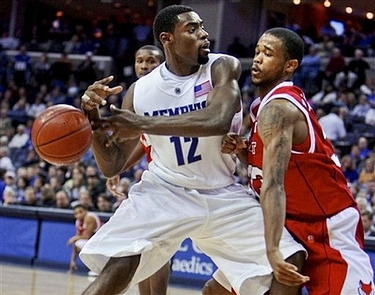
Joseph Treutlein
One of the most talented and highly touted players in this freshman class, Tyreke Evans' college career hasn't gotten off to the best start. Despite putting up strong production across the board (1st on team in points and steals, 2nd in assists, 3rd in rebounds), Evans' inefficiency has been incredibly alarming, with a TS% of 47%, second worst in his class among players with 20 minutes or more. Also, his worst shooting nights on the season (a combined 14-for-49) came in Memphis' three matchups with ranked opponents, all for losses.
Looking back at some of the scouting reports on Evans compiled on this website, the concerns with Evans' game have been well-known for some time. Despite being an outstanding athlete with excellent skills, there have always been red flags about how Evans would convert those abilities into a productive team player.
On the offensive end, Evans has spent many possessions over-dribbling the ball, as is his mantra. In isolation situations, he's extremely prone to settle rather than challenging his man, often choosing to pull up for contested, fadeaway jumpers that have gone in very sporadically thus far this season, as evidenced by his poor three-point shooting percentage. Evans' form is very reminiscent of Lebron James', with the constant fadeaway motion, however Evans doesn't have the consistent mechanics of James, not always holding his follow through and often just looking very sloppy in his mechanics. He's a very talented shooter, something we've seen firsthand in the past, but the results haven't come at the collegiate level yet, and his shot selection certainly has something to do with that.
When putting the ball on the floor, Evans has a great first step and a very high top speed with the ball, while he's also able to adjust around the rim, finish with either hand, and make creative finishes that take advantage of his excellent athleticism. He hasn't gone to this quite as much as he should, however, and when he does, he's prone to forcing shots against multiple defenders, pulling up in the middle of the lane for unbalanced, contested floaters that don't appear to be put up with much concentration.
As one of Memphis' primary ball-handlers, Evans has shown some prowess as a shot creator, though not what one would call a point guard just yet. With excellent vision and skills, Evans makes some outstanding plays with the ball, finding his man on the pick-and-roll and in transition, but he's very much a shoot-first player, and his decision-making is nowhere near where his court vision is, as evidenced by his 3.8 turnovers per game, second amongst all freshman thus far. His ball-handling skills have looked a bit shaky at times, something we'll have to take a closer look at as the season moves on.
On the defensive end, Evans is an outstanding weapon, pulling in 2.5 steals per game, but he does much of it at the expense of individual defense. Possessing solid athleticism, Evans flies all over the court on this end, at times over-pursuing and at times making plays that lead to the easiest of transition baskets. In man-to-man defense, he shows strong lateral quickness but a very inconsistent stance, gambling frequently and often giving up positioning. Despite this, he is usually able to recover when he tries against his competition, just because his change-of-direction abilities and lateral quickness are so good.
Looking forward, its clear Evans is an extremely talented player, but one who has much work to do to refine his game. It's definitely too early to make any finite judgments, given that Evans is still adjusting to the collegiate game and a new offensive system, but the habits he shows on the floor have been a consistent trend over the past few years.
In terms of skills and physical attributes, there isn't much Evans doesn't possess, but it's always been about how he applies them all to the game. He has an excellent coach at Memphis, playing in a system tailored to his skills and style of play, so he should have plenty of opportunities to improve over the next few months. However at the rate he's going thus far, one-and-done isn't looking like the best option, especially given his potential if he can improve his decision-making and take his game to the next level.
Looking back at some of the scouting reports on Evans compiled on this website, the concerns with Evans' game have been well-known for some time. Despite being an outstanding athlete with excellent skills, there have always been red flags about how Evans would convert those abilities into a productive team player.
On the offensive end, Evans has spent many possessions over-dribbling the ball, as is his mantra. In isolation situations, he's extremely prone to settle rather than challenging his man, often choosing to pull up for contested, fadeaway jumpers that have gone in very sporadically thus far this season, as evidenced by his poor three-point shooting percentage. Evans' form is very reminiscent of Lebron James', with the constant fadeaway motion, however Evans doesn't have the consistent mechanics of James, not always holding his follow through and often just looking very sloppy in his mechanics. He's a very talented shooter, something we've seen firsthand in the past, but the results haven't come at the collegiate level yet, and his shot selection certainly has something to do with that.
When putting the ball on the floor, Evans has a great first step and a very high top speed with the ball, while he's also able to adjust around the rim, finish with either hand, and make creative finishes that take advantage of his excellent athleticism. He hasn't gone to this quite as much as he should, however, and when he does, he's prone to forcing shots against multiple defenders, pulling up in the middle of the lane for unbalanced, contested floaters that don't appear to be put up with much concentration.
As one of Memphis' primary ball-handlers, Evans has shown some prowess as a shot creator, though not what one would call a point guard just yet. With excellent vision and skills, Evans makes some outstanding plays with the ball, finding his man on the pick-and-roll and in transition, but he's very much a shoot-first player, and his decision-making is nowhere near where his court vision is, as evidenced by his 3.8 turnovers per game, second amongst all freshman thus far. His ball-handling skills have looked a bit shaky at times, something we'll have to take a closer look at as the season moves on.
On the defensive end, Evans is an outstanding weapon, pulling in 2.5 steals per game, but he does much of it at the expense of individual defense. Possessing solid athleticism, Evans flies all over the court on this end, at times over-pursuing and at times making plays that lead to the easiest of transition baskets. In man-to-man defense, he shows strong lateral quickness but a very inconsistent stance, gambling frequently and often giving up positioning. Despite this, he is usually able to recover when he tries against his competition, just because his change-of-direction abilities and lateral quickness are so good.
Looking forward, its clear Evans is an extremely talented player, but one who has much work to do to refine his game. It's definitely too early to make any finite judgments, given that Evans is still adjusting to the collegiate game and a new offensive system, but the habits he shows on the floor have been a consistent trend over the past few years.
In terms of skills and physical attributes, there isn't much Evans doesn't possess, but it's always been about how he applies them all to the game. He has an excellent coach at Memphis, playing in a system tailored to his skills and style of play, so he should have plenty of opportunities to improve over the next few months. However at the rate he's going thus far, one-and-done isn't looking like the best option, especially given his potential if he can improve his decision-making and take his game to the next level.













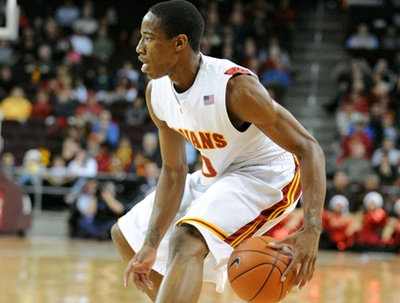


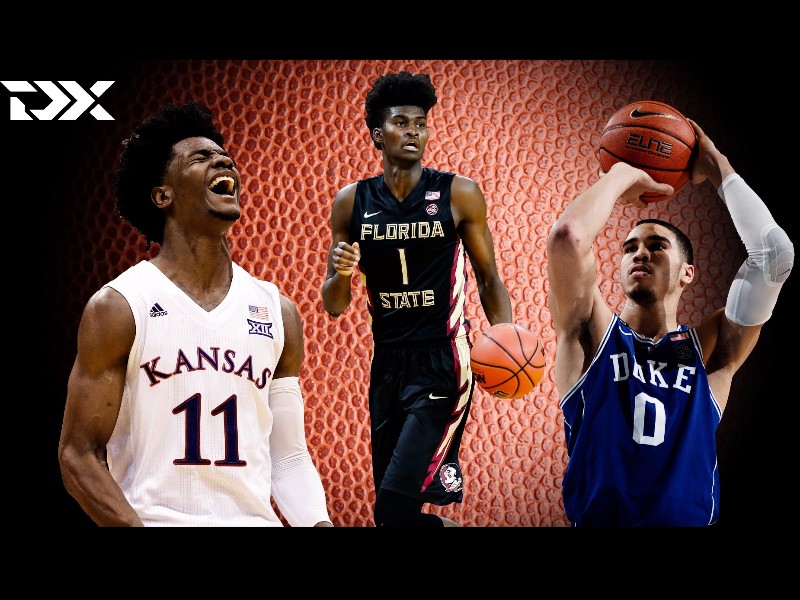
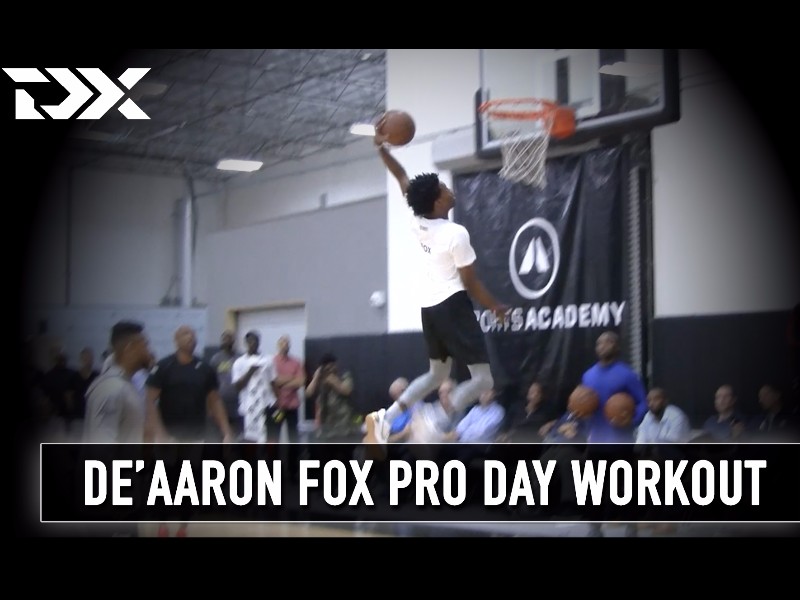















Comments